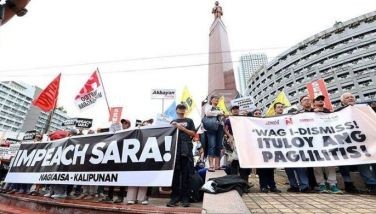T-bills seen dropping further
MANILA, Philippines - Treasury bill rates could drop further even as the yields fell to historic lows on Monday’s auction, said Jose Arnulfo Veloso, incoming Hong Kong Shanghai Banking Corp. (HSBC) Philippines chief executive officer (CEO).
In an interview late Monday, Veloso said the drop in the benchmark rates indicates a surge of foreign inflows into the Philippines, which could push the peso to further appreciate against the dollar.
“The strong T-bill result is already a clear indication of how the foreign exchange market will play. The point there is that there is going to be strong interest specifically from offshore markets and players who are putting their money in strong emerging markets like the Philippines whose got a good credit story to tell,” said Veloso, the first Filipino CEO to head HSBC Philippines effective December 24.
Yields on T-bills fell to historic lows during Monday’s auction, with the benchmark 91-day T-bill rate - used by banks in pricing their loans - falling to 0.150 percent from 0.463 percent previously. The yield on the 182-day T-bill fell to 0.450 percent from the previous rate of 0.700 percent while the 364-day T-bill rate fell to 0.680 percent from a previous rate of 0.950 percent.
These were the lowest rates seen in the Treasury’s record that go as far back as 1987.
With the surge in fresh inflows to emerging markets like the Philippines, the Bangko Sentral ng Pilipinas (BSP) is expected to be more proactive and creative in managing these hefty funds, Veloso said.
Nevertheless, he urged exporters, overseas Filipinos and their beneficiaries and other individuals or groups with dollar inflows to seek the help of their respective banks to help manage their situation.
“Exporters, OFWs and those that have dollar flows should speak to their banks,” Veloso said.
HSBC, for its part, has always been ready with hedging tools to help exporters and OFWs to manage their dollar inflows and help protect from further peso appreciation.
“On our end we always get in touch with our respective customers. For every customer, there is a different product,” Veloso said.
He expects the BSP and the Government to be proactive in managing the hefty inflows.
“I think both the BSP and the National Government would like to review it because everything on the extreme will not be healthy. I think they will be able to come up with something,” Veloso said.
On the part of the BSP, Veloso said there are a lot of measures that it can employ and may further require additional documentation of more inflows.
“There’s a lot of measures that the BSP can do. They’ve already managed a lot. The BSP has got a lot of tools to be able to do it. It’s really up to the BSP. The BSP is in a better position to (discuss these measures). There may be further documentation of more inflows,” Veloso said.
The BSP has said that it would use more “creative” measures, besides the usual interest-rate cut, to curb the negative impact of hefty foreign capital inflows.
In July, the BSP issued a regulation prohibiting banks from investing their foreign clients’ funds in special deposit accounts (SDAs) with the central bank.
The peso has so far averaged at P41.161 against the dollar as of November 12. In October, the peso averaged at P41.452 against the dollar.
- Latest
- Trending




























